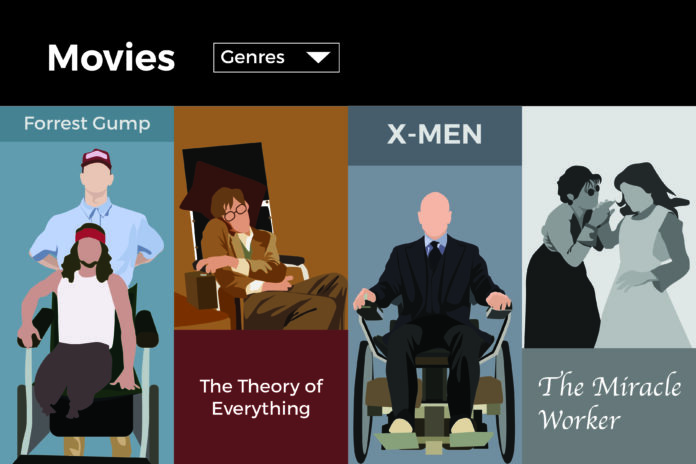How movies like “Split,” “Glass: can be damaging to people with disabilities
Movies are meant to entertain. Some make the audience cry, some make the audience laugh, but for the most part, people watch movies to enjoy themselves.
“Glass,” the third installment in M. Night Shyamalan’s “Unbreakable” trilogy, introduced a different genre of villains and follows the popular 2016 movie “Split.” “Split,” directed by Shyamalan, focuses on Kevin, played by James McCoy, as he kidnaps three girls and switches between his personalities, each posing a different scenario that the girls have to survive. While the girls do their best to stay alive, they learn that the personality they need to be wary of is the Beast. The Beast is an alleged superhuman being that will murder anyone that is ‘undamaged.’ Kevin, the villain, is diagnosed with dissociative identity disorder.
Director Shyamalan confessed that he has always had a fascination with dissociative identity disorder, according to The Guardian. And seeing how “Split’s” opening weekend brought in 40 million dollars, the public is obviously fascinated with the idea as well.
But when movies like “Split” and “Glass” are produced and their villain is a person with a disorder, it can affect people with these disorders in real life.
Milly Judd, a senior animal science major and co-director of the Mental Health Initiative, addressed the impact that these movies can have on those within the communities they are misrepresenting.
“You could be triggered because it’s inaccurately representing you,” Judd said. “Also if other people know you [have a mental disorder] … and then someone you know sees that movie, they’re going to think differently about you and that’s so unfair.”
Jennifer Billeci, director of the Student Disability Center, shared her thoughts on how difficult the situation can be for an individual with this disorder.
“I think it would be a really hard position to be in,” Billeci said. “In general, I would liken it to bullying. If you’re a person that is afraid that someone is going to think things about you that are negative or intrude you are probably less likely to be open with them and communicating freely.”
Many people learn about mental illness through the media. Mainstream media, however, has an undeniable reputation of stretching the truth, and when people with disabilities are represented in extreme circumstances, it’s no different.
“Culturally sometimes when people think of other people’s disabilities they think of them as being so different that sometimes they assign all kinds of personality traits that are no more true in a disabled community than as non-disabled people and sometimes it’s being a villain,” Billeci said.
Despite the number of movies that misrepresent people with mental illnesses, there are movies that are applauded for the way they deal with the subject.
“There are some movies like ‘Silver Linings Playbook’ that deal with it well,” Judd said. “I think we are getting better at it but I think that there are still the small amount that villainize it.”
The movie “Split” depicts dissociative identity disorder as a disorder that is potentially dangerous and harmful to others. The stereotype that people with disorders are violent and have criminal tendencies is ultimately spread through movies like “Glass” and “Split”, but people with mental illnesses such as dissociative identity disorder are less likely to commit crimes and more likely to be victimized, according to U.S.News.
“They can compound misconceptions and misunderstandings when you paint the villain as somebody with a psychological disability or psychiatric diagnosis,” Billeci said. “When the reality is that people with a psychiatric diagnosis are not any more likely than anybody else in the population to display criminal behavior or things along those lines.”
The media is a powerful tool in spreading information, or in this case misinformation. While movies continue to be released based off of people with real disabilities, more individuals are misinformed.
“Movies are a great financial industry,” Billeci said. “When audiences go and applaud those types of messaging that it keeps the motivation going to have storylines along those kinds of thoughts and people are curious people so if you don’t know somebody with mental illness you might find this fascinating, but you might start taking some of the fantasy of the movie as being fact. Then that can be destructive too.”
With the right background knowledge and a deep understanding of the disabilities, movies and television can help people see beyond the stereotypes that have been forced onto others and give them the rights that they deserve, according to the United Nations.
“Things are more known about mental health illnesses” Judd said. “And so if you’re making something that kind of makes it in a bad way, makes fun of it, makes it seem unnatural, anything like that, it might not be consciously intentional but subconsciously it might be because they don’t accept it.”
Individuals with disabilities are not the only group dealing with being portrayed as villains by the media. The media loves to paint people that are different as the antagonists, and it hasn’t been any different with marginalized groups in the past.
“If you look back at history we portray groups in an unfair and an unfavorable light and as society, I would hope, becomes more enlightened is reduced,” Billeci said. “If you look back at how women were treated in movies, people of color were treated in movies, which still happens but not the same way culturally we found acceptable a few decades ago.”
People should take away several things as they leave the theater.
“Keep in mind, not everything you see on the surface is what is really happening and not everything appears as it is to be,” Judd said. “You shouldn’t judge by their inaccurate representations and if you do identify with [the disorders] then just know that that’s not real and you’re not alone and you’re not this weird outsider, villain outcast kind of thing.”
Written by: Itzelth Gamboa — arts@theaggie.org




